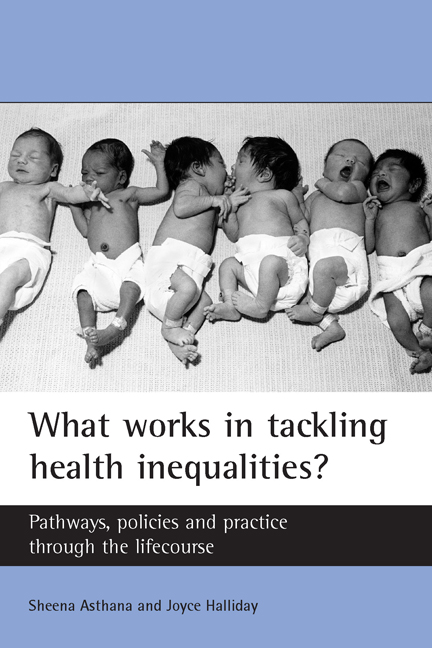Book contents
- Frontmatter
- Dedication
- Contents
- List of tables, boxes and figure
- Acknowledgements
- List of abbreviations
- one Introduction
- Part 1 The research and policy context of health inequalities
- Part 2 Health inequalities pathways, policies and practice through the lifecourse
- Part 3 Tackling health inequalities: developing an evidence base for public health
- Index
Part 1 - The research and policy context of health inequalities
Published online by Cambridge University Press: 14 January 2022
- Frontmatter
- Dedication
- Contents
- List of tables, boxes and figure
- Acknowledgements
- List of abbreviations
- one Introduction
- Part 1 The research and policy context of health inequalities
- Part 2 Health inequalities pathways, policies and practice through the lifecourse
- Part 3 Tackling health inequalities: developing an evidence base for public health
- Index
Summary
It is doubtful whether the original architects of the welfare state would have predicted that, at the start of the 21st century, health in the UK would be been even more unequal than it was in 1948, the year in which the National Health Service (NHS) was launched. It is, of course, generally accepted today that the health service has a relatively small role to play in the determination of health and well-being in the population. At the time, however, the formation of the NHS reflected a strong sense of social justice and a belief that health was a basic right, the enjoyment of which should not depend on an individual's wealth.
By the late 1970s there was growing awareness that the NHS had not made a marked impact on differences in the health of those at different ends of the social spectrum. The publication of the Black Report in 1980 demonstrated that, with respect to a range of indicators, health differentials between the most affluent and the most impoverished in British society had grown wider. As we discuss in Chapter Two, the Black Report had a limited impact on policy making during the 1980s and much of the 1990s. However, it did stimulate extensive research into health inequalities by social scientists and, increasingly, epidemiologists. It inspired similar research in European countries and kept health inequalities at the forefront of the public health agenda in the UK.
Chapter Two in this part examines the ways in which research on health inequalities has developed in recent years, first looking at the Black Report and its legacy and second at key research developments in the 1990s and 2000s, which include the rise of lifecourse epidemiology. The way in which different explanations for health inequalities give rise to different policy responses is explored during this discussion, with particular reference to the distinction that is commonly drawn between so-called ‘upstream’ policies that target the underlying determinants of health and ‘downstream’ interventions that target narrow clinical or behavioural factors, usually at an individual level.
This is examined practically in Chapter Three, which traces the evolution of policy responses to health inequalities research. Focusing in particular on developments since New Labour assumed power, we find a policy rhetoric that is highly responsive to research findings on the causes of health inequalities.
- Type
- Chapter
- Information
- What Works in Tackling Health Inequalities?Pathways, Policies and Practice through the Lifecourse, pp. 19 - 20Publisher: Bristol University PressPrint publication year: 2006



